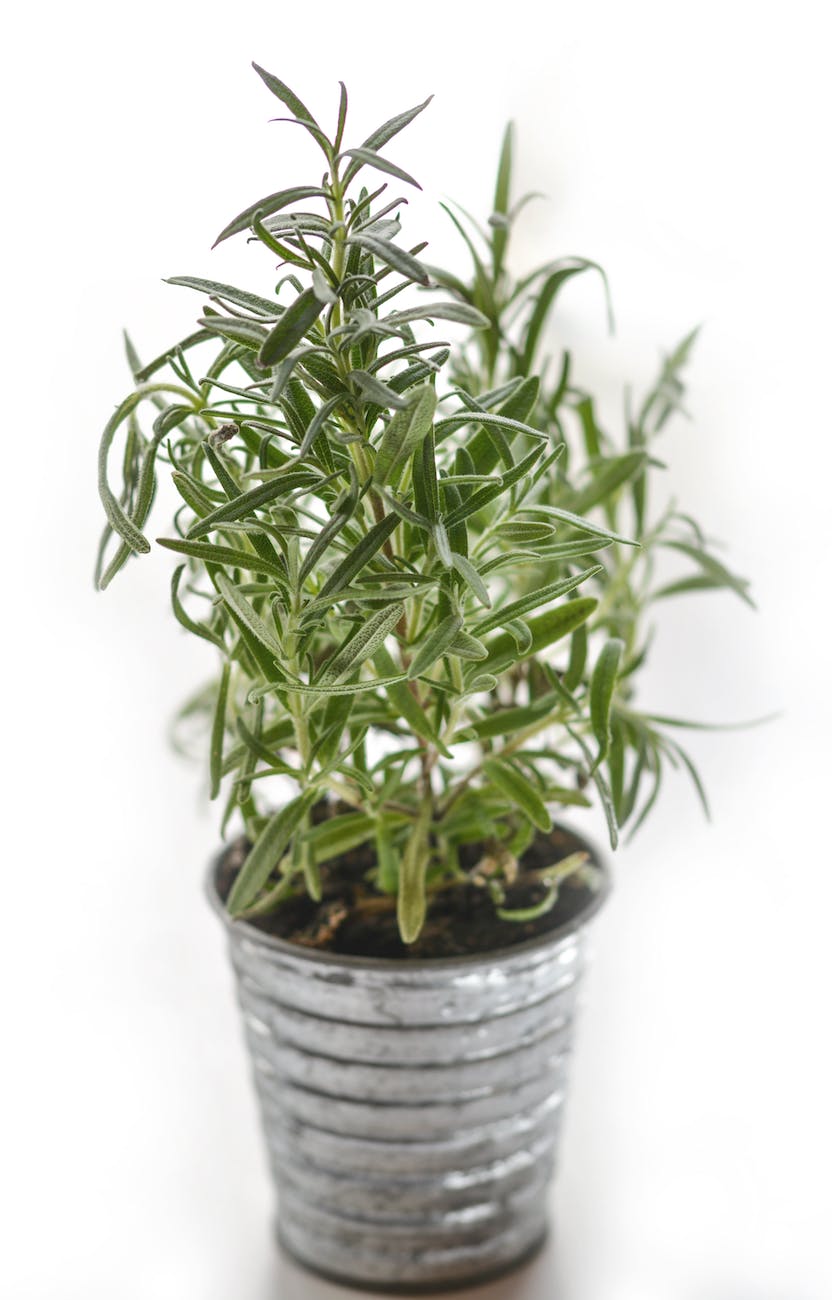What Does Rosemary Smell Like?
Ah, rosemary! One of the most aromatic herbs in our kitchens and gardens.
The rosemary scent is truly distinct and unforgettable. If you’ve never had the pleasure of experiencing it, let’s paint a picture with words.
Rosemary smells equally earthy and refreshing, an intoxicating blend that is hard to describe but easy to recognize. It’s akin to pine needles with a hint of peppermint and lemons, creating an invigorating aroma that has a crisp freshness about it.
This delightful smell comes primarily from its needle-like leaves which release their fragrance when brushed or crushed— a sharp yet delicate scent that lingers somewhat persistently in the air. The rosemary flower also contributes to this unique fragrance profile.
When these tiny blooms appear, usually in shades of blue or purple, they carry a slightly sweeter version of the classic rosemary smell. The flower’s perfume is subtle compared to the intense aroma of its leaves but does add depth and complexity to the plant’s overall scent profile.
In essence, catching a whiff of rosemary is like taking a refreshing stroll through an evergreen forest while sipping on mint-infused lemonade under clear blue skies. Its unique aroma has drawn people towards it for centuries – not just as an appetizing herb but also as a symbol in various cultural contexts for remembrance due to its unforgettable scent.
The History of Rosemary
Delving into the annals of history, we find that rosemary has a rich and fascinating story to tell. This fragrant herb’s usage can be traced back to ancient civilizations. The Romans, Greeks, Egyptians… they all held rosemary in high regard.
This was not just for its smell but also for its medicinal properties and symbolic significance. It was often used in religious ceremonies and weddings, a testament to the plant’s central role in these societies.
It might surprise you to know that the name “Rosemary” is derived from Latin, “Rosmarinus,” which translates to “dew of the sea.” Now isn’t that poetically beautiful? This is probably because rosemary grows abundantly near the Mediterranean Sea where it originated from.
Take a moment to picture this – sprawling fields of rosemary against the backdrop of deep blue waters under a sunny sky. You could almost smell rosemary scent wafting through on the gentle breeze.
Over centuries, as explorers and traders roved around the world, they took rosemary along with them. The herb found homes in different parts of globe and soon became an integral part of various cultures’ culinary arts, medicinal practices and even folklore!
Many associated its strong smell with memory and remembrance – giving it another symbolic dimension beyond its already numerous roles. There’s so much more than just meets the eye when it comes to this humble herb!
Have you ever seen a rosemary flower? Its delicate bloom belies its potent scent!
One look at this unassuming blue flower wouldn’t immediately bring forth associations with such a powerful aroma that’s so unmistakable yet quite difficult to describe – but once you experience it first hand you’d remember – there’s nothing quite like the smell of rosemary! So next time you come across this herb or perhaps have an opportunity to cook with it – take a moment; take in that fresh pungent aroma steeped in history and marvel at just how much this single plant has contributed to human civilization.
The Benefits of Rosemary
Indeed, the smell of rosemary is not only a sensory delight but also signals the onset of numerous health benefits. This humble herb, with its distinctive aroma, carries an assortment of therapeutic properties that have been celebrated for centuries.
The rosemary scent is more than just pleasing to the olfactory senses. It has been known to boost memory and improve concentration.
A study conducted by Northumbria University suggested that exposure to rosemary essential oil can enhance cognitive performance, particularly in memory recall tasks. So next time you find yourself struggling with focus or reminiscence, perhaps a whiff of fresh rosemary might just do the trick.
Moreover, it’s been found that this aromatic herb may aid digestion and promote optimal gastrointestinal health. Its anti-inflammatory compounds can help soothe an upset stomach and relieve bloating or discomfort.
The smell of rosemary wafting from a warm cup of herbal tea could be your answer to digestive woes! Another commendable benefit lies within the realm of hair care.
Traditionally used in many cultures for promoting hair growth and reducing scalp issues like dandruff, incorporating rosemary oil into your beauty regimen might yield noticeable results over time. The refreshing smell further elevates this experience, making it a holistic self-care ritual.
Venturing into skincare benefits – the antioxidants in rosemary make it a potential ally against premature skin ageing. It helps fight free radicals which are essentially responsible for ageing signs like wrinkles and fine lines; therefore regular application may result in youthful looking skin with better texture and tone.
But these benefits aren’t limited to humans only! Rosemary’s potent insecticidal properties make it effective against certain pests as well.
The strong aroma deters many insects, so next time you’re bothered by pesky bugs during an outdoor event or picnic – consider placing some sprigs of fresh-cut rosemary around your area. In essence, one simply cannot overlook the rich tapestry woven by myriad benefits the rosemary flower offers.
Its familiar scent navigating through our homes and gardens is more than just a symbol of good taste or aesthetic appeal – it’s a testament to nature’s remarkable ability to heal, protect, and enhance. So next time you encounter that unmistakable rosemary smell, remember – there’s more than meets the eye (or shall we say, nose?).
What’s Rosemary Good For
Rosemary is not merely a pleasant smelling shrub; it’s a versatile herb with a plethora of uses. For one, it’s a staple in many culinary practices.
The robust, slightly minty flavor that rosemary infuses into dishes is nothing short of delightful. You can find the aromatic presence of rosemary in various cuisines worldwide – from the succulent roast lamb dressed with rosemary in Mediterranean cooking to the comforting bowl of minestrone soup in Italian households.
Let’s not forget how gorgeous the rosemary flower is! Its beautiful blue flowers blossoming amidst slender leaves add an aesthetic touch to any garden.
But beyond its visual appeal, the rosemary flower and its leaves are often used as an aromatic botanical ingredient in perfumes and other beauty products. The distinctive smell of rosemary, both invigorating and subtle, makes it a favorite amongst perfume makers trying to capture that unique freshness typical of an open countryside.
Beyond gastronomy and aesthetics, rosemary has been recognized for centuries for its health benefits too. It’s been known to boost memory, promote hair growth, relieve pain and inflammation among other things.
One could say the real beauty of this herb lies not just in its fragrant smell or pretty flowers but also in these impressive health benefits. In aromatherapy practices too, you’ll often encounter the pervasive scent of this remarkable herb.
The soothing yet stimulating smell of rosemary can be quite therapeutic – helping alleviate stress whilst rejuvenating your senses. So you see?
Be it enhancing flavorsome dishes or being woven into elegant perfumes or even being part and parcel of natural therapeutic treatments – Rosemary has so much to offer! The enchanting allure encapsulated within the potent aroma permeates all senses – sight by its visually appealing petals, taste by its culinary charm and smell by its captivating fragrance!
Conclusion
As we determine to close this aromatic journey that has taken us through the verdant fields of rosemary, it’s essential to reflect on the myriad facts and facets about this remarkable herb that we’ve unraveled. The multifaceted smell of rosemary, with its piney freshness and a dash of earthy undertone, is one that invigorates our senses and refreshes our mind. The rosemary scent is far more than just an enticing fragrance.
It’s a captivating blend of nature’s charm, ancient tradition, and modern health benefits. This exploration into the aroma world has brought us face-to-face with how integral the rosemary smell is in different aspects of life – cuisine, aromatherapy, or even simple home gardening.
Whether in its fresh green state or dried for convenience, whether burnt as incense or infused as oil – every iteration brings forth a new side to explore and appreciate about the scent of rosemary. Moreover, understanding the historical significance and health benefits associated with Rosemary makes it even more worthwhile to introduce it into our day-to-day lives.
Not forgetting how rosemary flowers can enhance gardens’ beauty with their delicate blossoms while enveloping the surroundings in their mesmerizing scent. There’s indisputably something magical about Rosemary – right from its robust green leaves up till its blooming blue flowers.
Here’s hoping for you to be swept up in this aromatic whirlwind that’s bound to leave your senses enchanted! May you relish this journey through all your encounters with Rosemary – from tasting it in culinary delights to savoring its fragrant aroma in everyday life.

